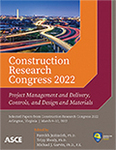A Rating Score for Assessing the Risks and Challenges Associated with Modular Construction
Publication: Construction Research Congress 2022
ABSTRACT
The construction industry has been shifting from the stick-built methods to modularization. Despite such increased adoption, the industry has not yet been able to fully capture the benefits of modular construction methods due to various associated risks and challenges. While many research efforts have studied the various decision-making processes and operations related to modular construction projects, none is perceived to have developed a risk-based framework to assess the challenges associated with the use of modularization in construction projects. This paper fills this knowledge gap. In a previous research, the authors identified 50 factors affecting modular construction projects. Consequently, an industry survey was developed to quantify the identified risk factors in terms of their likelihood of occurrence, and relative impact. Based on 48 survey responses, this study conducted statistical testing to group the modular risks into risk tiers based on their statistical significance. Furthermore, a scoring system was developed as to allow for quantitative assessment of the challenges associated with the use of modularization. This research should help stakeholders make informed decisions about utilizing modularization in their projects by allowing a proactive management to the various associated challenges and risks.
Get full access to this article
View all available purchase options and get full access to this chapter.
REFERENCES
Arashpour, M., B. Abbasi, M. Arashpour, M. R. Hosseini, and R. Yang. 2017. “Integrated management of on-site, coordination and off-site uncertainty: Theorizing risk analysis within a hybrid project setting.” Int. J. Project Manage. 35 (4): 647–655.
Bertram, N., S. Fuchs, J. Mischke, R. Palter, G. Strube, and J. Woetzel. 2019. Modular construction: From projects to products. McKinsey & Company: Capital Projects & Infrastructure, 1–34.
Choi, J. O., J. T. O’Connor, Y. H. Kwak, and B. K. Shrestha. 2019. “Modularization business case analysis model for industrial projects.” J. Manage. Eng. 35 (3): 04019004.
Cochran, W. G. 1977. Sampling techniques. 3rd ed. New York: Wiley.
Fisher, D. J., and M. J. Skibniewski. 1992. Computerized decision support for modularization of industrial construction. Univ. of Texas at Austin, Construction Industry Institute.
Gibb, A. G. 1999. Off-site fabrication: Prefabrication, pre-assembly and modularization. Scotland, UK: Whittles Publishing.
Jaillon, L., and C. S. Poon. 2008. “Sustainable construction aspects of using prefabrication in dense urban environment: A Hong Kong case study.” Constr. Manage. Econ. 26 (9): 953–966.
Jaillon, L., and C. S. Poon. 2010. “Design issues of using prefabrication in Hong Kong building construction.” Constr. Manage. Econ. 28 (10): 1025–1042.
Khalili, A., and D. K. Chua. 2013. “IFC-based framework to move beyond individual building elements toward configuring a higher level of prefabrication.” J. Comput. Civ. Eng. 27 (3): 243–253.
Larsson, J., P. E. Eriksson, T. Olofsson, and P. Simonsson. 2014. “Industrialized construction in the Swedish infrastructure sector: Core elements and barriers.” Constr. Manage. Econ. 32 (1–2): 83–96.
Murtaza, M. B., and D. J. Fisher. 1994. “Neuromodex—Neural network system for modular construction decision making.” J. Comput. Civ. Eng. 8 (2): 221–233.
Nadim, W., and J. S. Goulding. 2010. “Offsite production in the UK: the way forward? A UK construction industry perspective.” Constr. Innovation 10 (2): 181–202.
O’Connor, J. T., W. J. O’Brien, and J. O. Choi. 2013. Industrial modularization: How to optimize; how to maximize. Austin, TX: Univ. of Texas at Austin, Construction Industry Institute.
O’Connor, J. T., W. J. O’Brien, and J. O. Choi. 2014. “Critical success factors and enablers for optimum and maximum industrial modularization.” J. Constr. Eng. Manage. 140 (6): 04014012.
Rahman, M. M. 2014. “Barriers of implementing modern methods of construction.” J. Manage. Eng. 30 (1): 69–77.
Research and Markets. 2021. “Modular Construction Market-Growth, Trends, COVID-19 Impact, and Forecasts (2021-2026)”. Accessed May 23, 2021. www.researchandmarkets.com/reports/4515000/modular-construction-market-growth-trends.
Song, J., W. R. Fagerlund, C. T. Haas, C. B. Tatum, and J. A. Vanegas. 2005. “Considering prework on industrial projects.” J. Constr. Eng. Manage. 131 (6): 723–733.
Taghaddos, H., U. Hermann, S. AbouRizk, and Y. Mohamed. 2014. “Simulation-based multiagent approach for scheduling modular construction.” J. Comput. Civ. Eng. 28 (2): 263–274.
Wang, Z. Z., and B. Shi. 2013. “Decision making and economic analysis for accelerated bridge construction.” Appl. Mech. Mater. 423–426: 2196–2201.
Information & Authors
Information
Published In
History
Published online: Mar 7, 2022
Authors
Metrics & Citations
Metrics
Citations
Download citation
If you have the appropriate software installed, you can download article citation data to the citation manager of your choice. Simply select your manager software from the list below and click Download.
